Areas of Specialization in Philosophy — Data from 2022-23 (guest post)
What areas of specialization (AOS) are philosophy departments hiring in?
In the following guest post, Charles Lassiter (Gonzaga University) shares his analysis of data he gathered about the areas of specialization advertised by hiring departments on PhilJobs: Jobs for Philosophers during the 2022-23 job market.
Thanks to Professor Lassiter for putting together this report, which must have taken a a lot of work.
[A version of this post first appeared at Professor Lassiter’s site.]
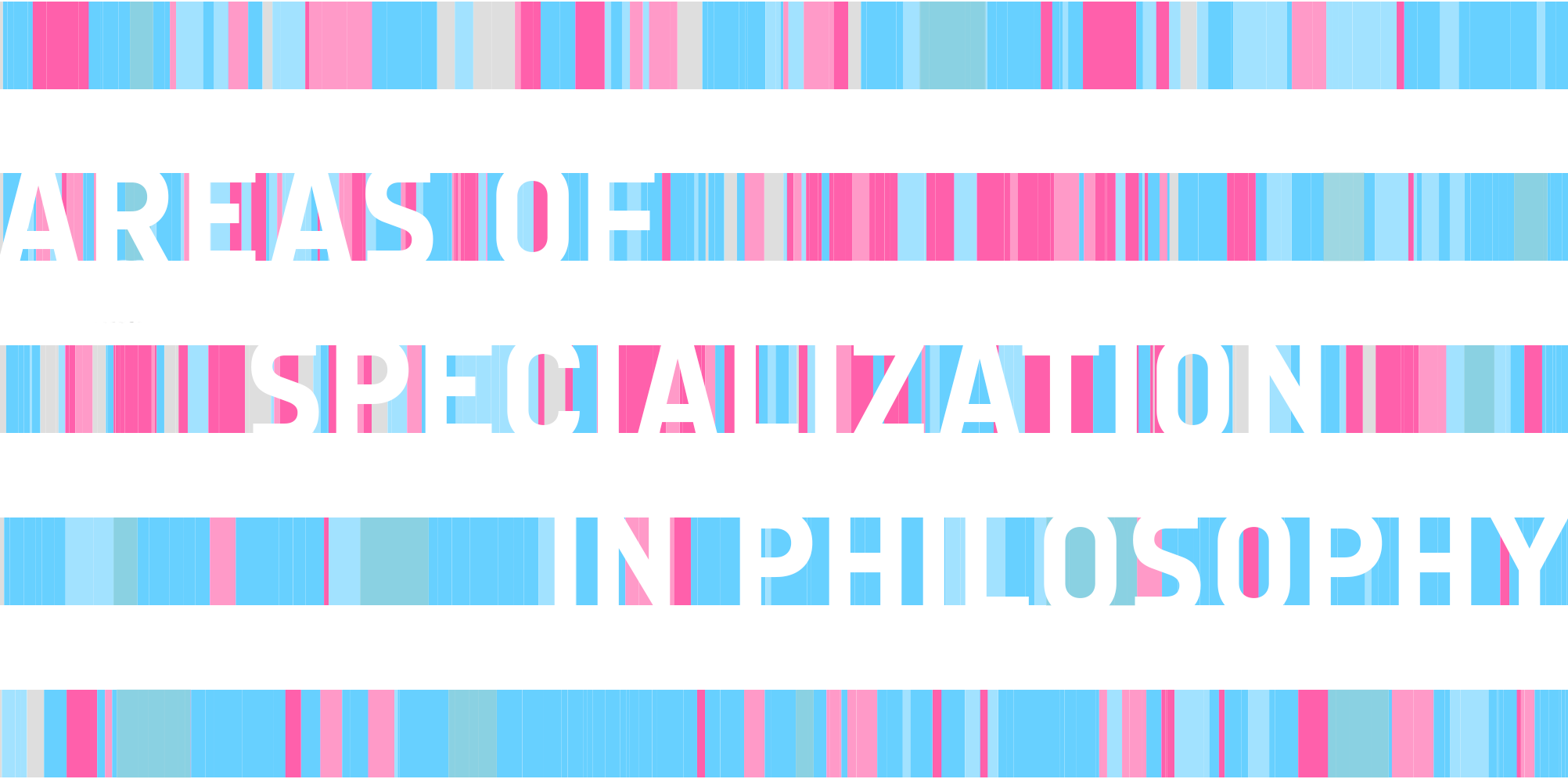
Areas of Specialization in Philosophy:
Data from 2022-23 Job Market
by Charles Lassiter
Hello! This post is going to be a long one. So get some coffee or tea or beer (who am I to judge?) and let’s get to it.
First, some preliminaries. Counting AOS’s is hard. Here’s how I’m doing it. There are ads that had one AOS: history/traditions, open, etc. But there are others that are disjunctions: history/traditions or metaphysics/epistemology. Since we’re looking at major trends, I counted each member of the disjunction separately. So if the AOS was metaphysics/epistemology or value theory, then the total count for metaphysics/epistemology goes up by one and same for value theory. Breaking up and counting disjunctions in this way tells us more about disciplinary trends than either (i) dropping one-off disjunctions or (ii) keeping disjunctions as their own categories. If you’re interested in more fine-grained analyses, go ahead and check out the data set.
Second, there are some AOS that don’t fit neatly into any of the categories on PhilJobs, like philosophy of technology. I did my best in each case to figure out what the job was looking for and then apply the relevant tags. Again, readers are welcome to follow up with the data.
Third, the numbers in each plot are not a count of jobs. If an ad has A or B or C as main AOS’s, each AOS counts in the tally towards the number of A‘s, B‘s, and C‘s in the data. And if we’re treating the numbers as counts for jobs, then that one job gets counted three times. So use the values as comparisons within a plot, not across plots.
Finally, AOS’s here are divided into two kinds. The first kind are the main AOS’s. These are:
(1) open
(2) value theory
(3) metaphysics/epistemology
(4) history/traditions, and
(5) science/logic/mathematics.
Then, under each of these (except “open”), there are the second kind: more detailed AOS’s, like ethics, aesthetics, and philosophy of religion under value theory. “Main AOS” will be used to pick out one of the five top-level categories. “Detail AOS” will be used to pick out second-level categories.
One of the themes I’ll come back to throughout this post is looking at detailed AOS’s alone versus with other AOS’s. It seems this can provide some insight into the structure of the discipline. First, a working hypothesis: Ads featuring multiple main AOS’s would be more likely to hire someone who ticks as many boxes as possible, all other things being equal. Why? Suppose an ad asks for specialization A or B. If you have two candidates who are equal in all other respects except one specializes in A while the other specializes in A and B, the latter candidate is more desirable than the former. If that’s right, then the presence of multiple AOS’s in an ad is a proxy for the desirability of candidates with fingers in several AOS pies and the popularity of crossing intradisciplinary boundaries.
Ok, let’s do it.
First the big picture:
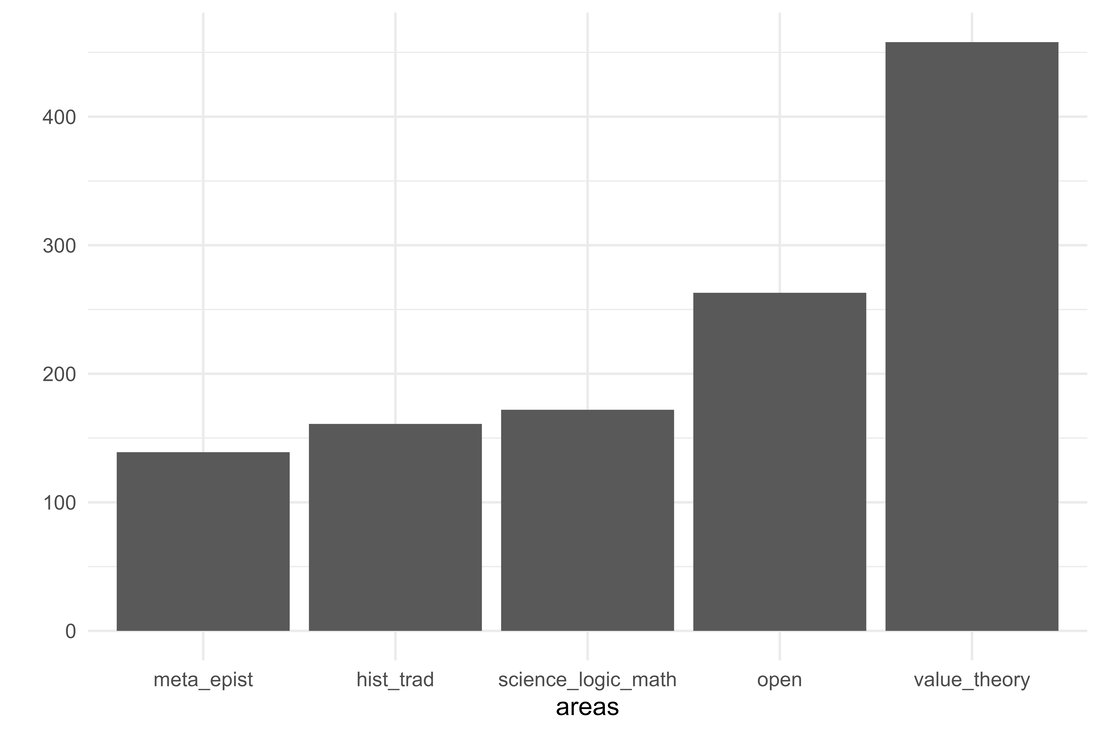
Value theory shows up most often in AOS, which (to be honest) is surprising. I would have guessed “open” but here we are. The reason is that value theory showed up in a lot of disjunctions: value theory or metaphysics/epistemology; value theory or history/traditions, etc–that is, lots of jobs were for value theory alongside some other area. Now, if we don’t break up the disjunctions (against what I said above), “open” has the greatest number of ads. So the story here is that value theory had a very good year, showing up a lot both as a solo AOS and alongside other AOS’s. Metaphysics/epistemology, science/logic/math and history/traditions are roughly on par with one another.
Personally, I find metaphysics/epistemology bringing up the rear to be kind of surprising. When I was in grad school (*cue sounds of a rocking chair*), LEMMings were all the rage. Maybe not so much anymore.
Ok, now let’s zoom in on each of these.
VALUE THEORY
Here are the more detailed areas for ads in value theory.
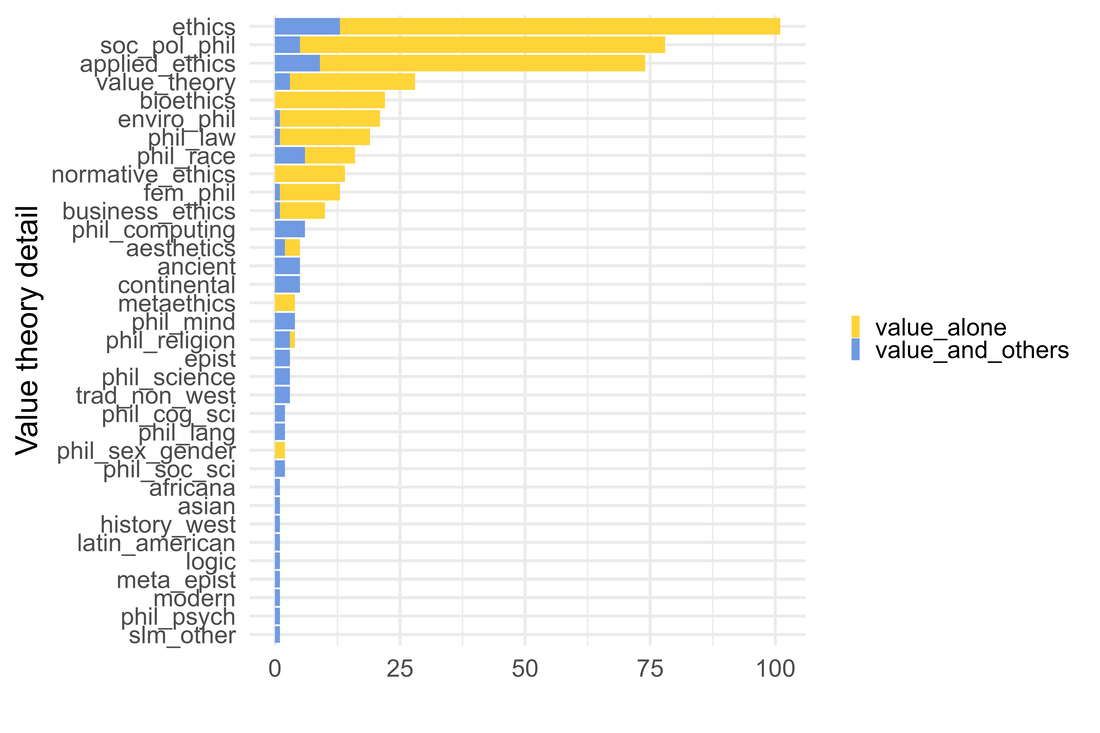
Fairly self-explanatory, but a few things of note. First, for the top 11 detailed AOS (ethics through business ethics), the overwhelming majority of ads feature value theory alone as the main AOS. Second, there’s nonetheless a long tail on the data, so value theory shows up with a lot of other AOS’s.
The dominance of ethics and social-political philosophy isn’t too surprising. These are mainstays of gen ed requirements.
You’ll notice some that seem strange on a list of value theory: philosophy of computing, epistemology, and philosophy of mind (among others). Let’s parse out the data to see differences in ads that are value theory alone and value theory with other AOS’s. First we look at value theory all by its lonesome:
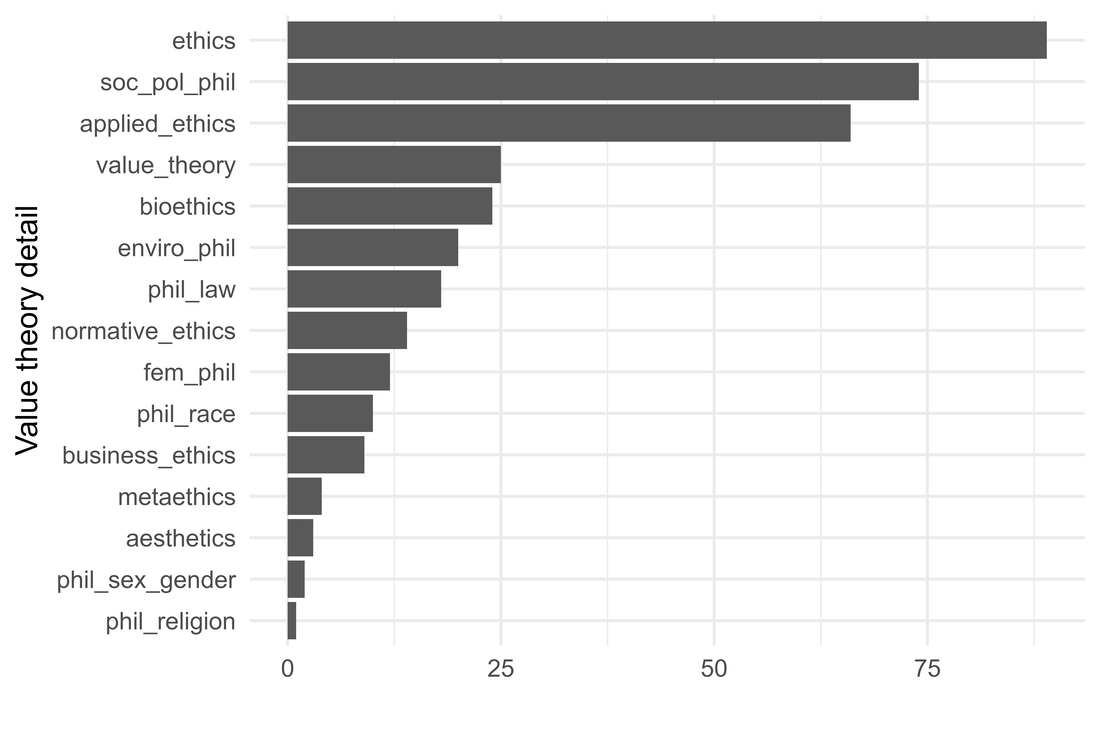
The structure of the data (more or less) reflects the big picture above: ethics, soc-pol, and applied ethics taking the lead with other value theory categories trailing behind.
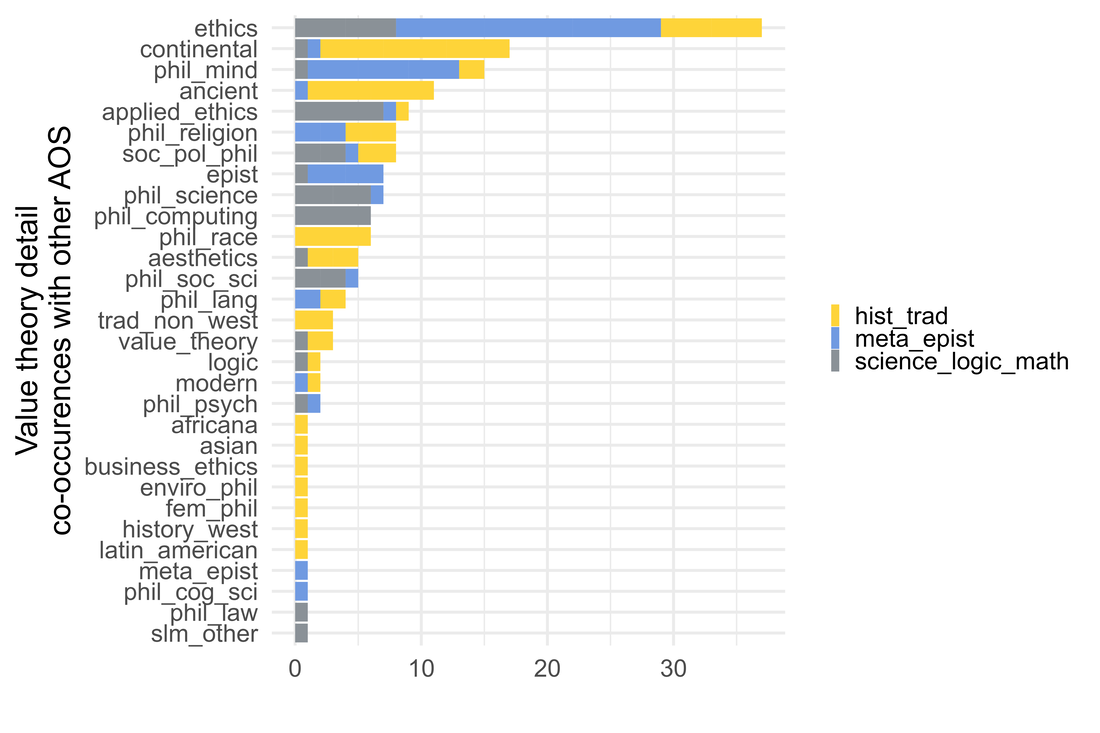
Here’s how to interpret this plot: each of the AOS’s on the left appeared with an ad tagged “value theory.” The colors are the other main AOS’s that the keyword appeared with. For example, look at “philosophy of mind”: when it appeared in ads tagged with “value theory,” those ads were also tagged with history/traditions, metaphysics/epistemology, and science/logic/mathematics. Of those other tags, metaphysics/epistemology showed up most often.
The big trends are interesting. Whenever “ethics” shows up in the context of other main AOS’s, it’s most often with metaphysics/epistemology. So one would expect that ethicists who also do some metaphysics or epistemology would be better positioned for these kinds of jobs than folks doing only ethics.
Likewise, notice under “applied ethics” that it occurred most often with the main tag “science/logic/math.” On reflection, this makes sense given the rise of ads looking for philosophers working in philosophy of tech and/or AI (discussed below).
When “philosophy of race” shows up with other main AOS tags, it’s exclusively with history/traditions. This reflects what we find in the data: ads looking for philosophers of race typically mention non-Western philosophy in the ad.
HISTORY AND TRADITIONS
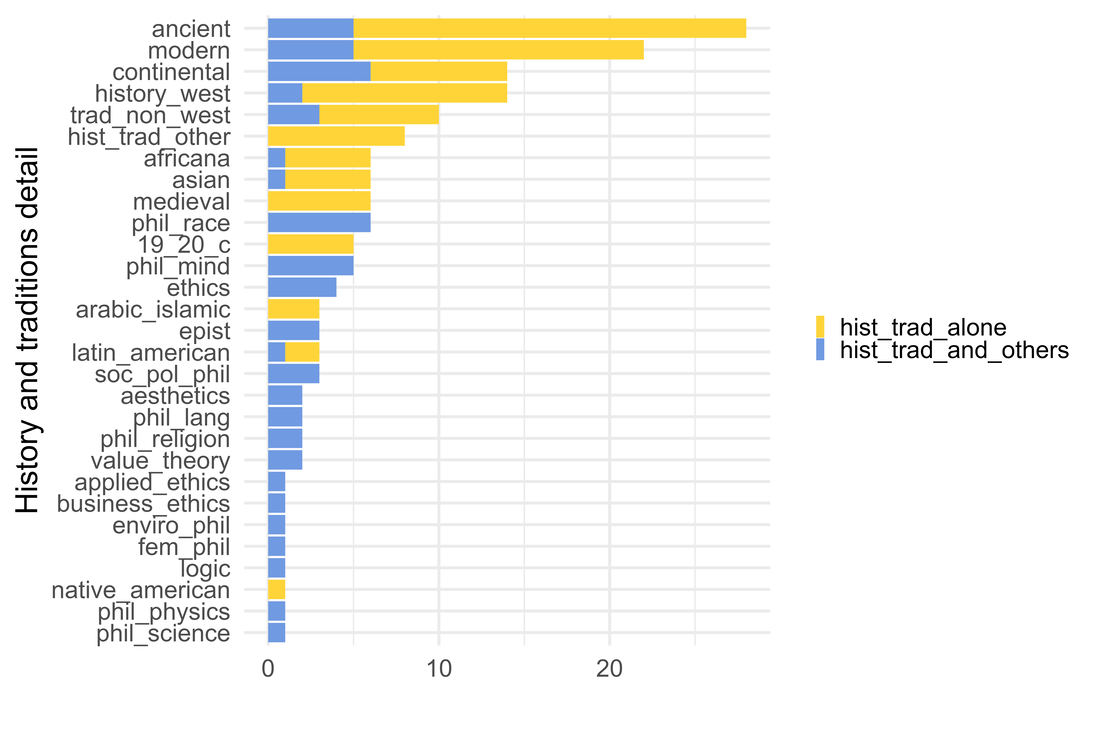
A word on the data: whenever an ad listed a string of non-Western traditions, I used the label “trad_non_west.” This covers anything that isn’t Western philosophy (including American and Continental). The only time I didn’t use this tag for a string of non-Western AOS’s is if there were only 2 or 3 members of the disjunction (e.g. “Latin American or Native American”).
A few things of note. Ancient and modern are the most looked-for. Continental and the history of western philosophy are just about even. And fairly far behind is any kind of non-western tradition: Africana, Asian, Arabic/Islamic, Native and Latin American. Bringing up the rear for traditions, we find Native American and Latin American. Now, they’re included under the generic “non-western” label, so not all hope is lost. The prudent interpretation is that departments in the last year are more interested in Native American and Latin American as members of non-Western traditions rather than as traditions in their own right.
Out of curiosity, let’s compare tags for Western philosophy vs non-Western.
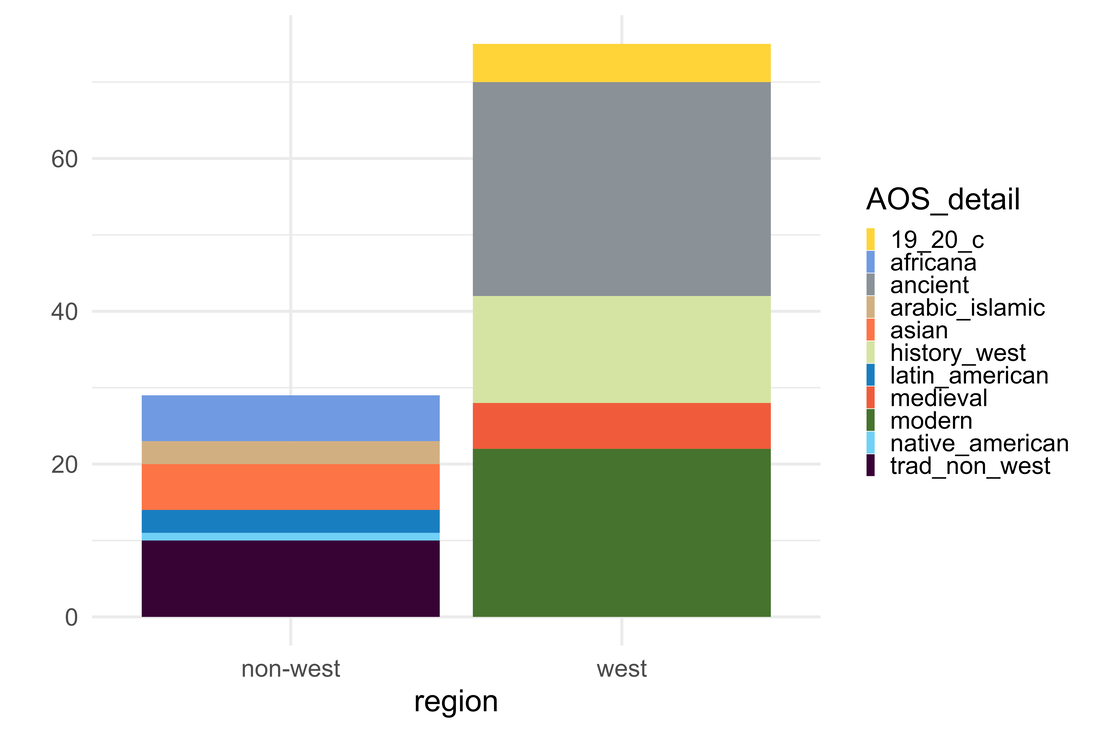
There are a lot more ads mentioning Western philosophy (75) than non-Western (25). The lion’s share of non-Western tags are for anything in a non-Western tradition. Native American philosophy appeared once last year. So while non-Western traditions are appearing more and more on the contemporary scene (e.g. Chalmers’s book Reality+, Peter Adamson’s fantastic podcast), they’re still lagging far behind in job-ad mentions.
Now to look at history/tradition filtering out any ads that included other main AOS’s:
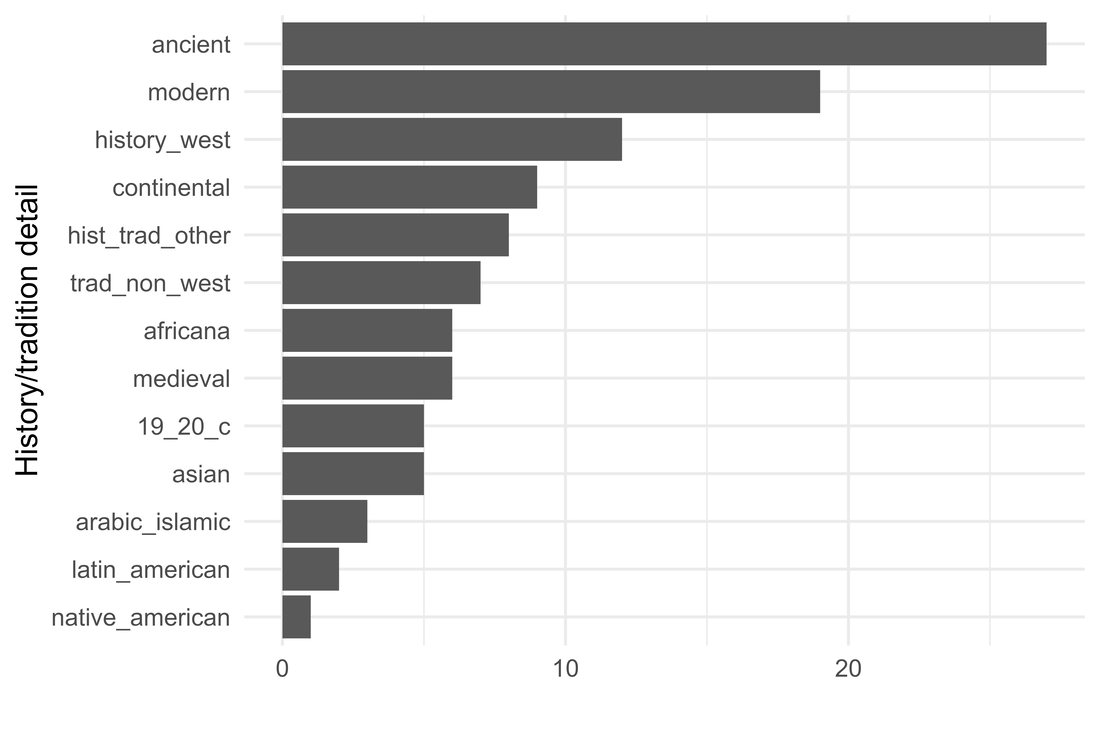
Looking at history/traditions detail AOS, where only “value theory” is the main AOS, we see the history of Western philosophy is most advertised-for: either ancient, modern, or just in general. Ads under “hist_trad_other” include detailed AOS’s that don’t fit neatly under any other history/tradition category, like Kantian, post-Kantian, phenomenology & history of philosophy, and digital humanities.
Now let’s look at history and traditions where they appear with other main AOS’s.
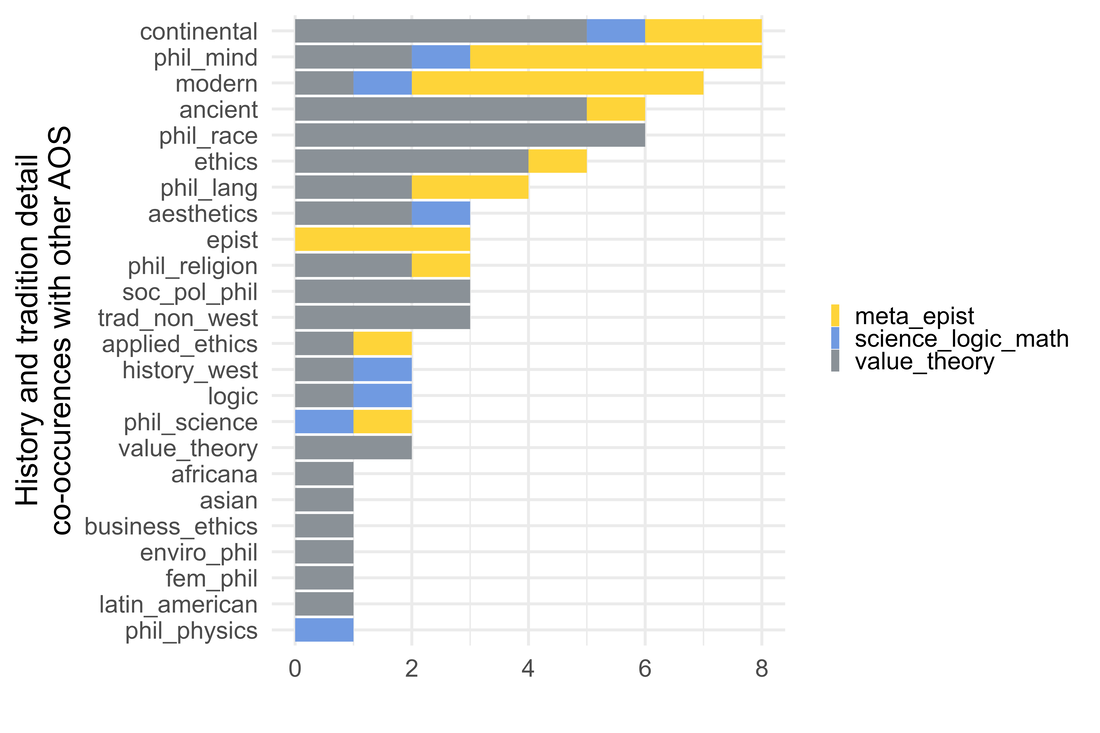
First, notice the relatively small number of mentions: history and traditions don’t typically show up with other main AOS’s.
Here’s a noticeable trend: history/traditions ads, when they appear with other main AOS’s, are typically coupled value theory (21). It doesn’t seem that departments are looking for history/tradition (8) or metaphysics/epistemology (10) alongside someone doing something in science, logic, and math.
SCIENCE, LOGIC, MATH
The big picture:
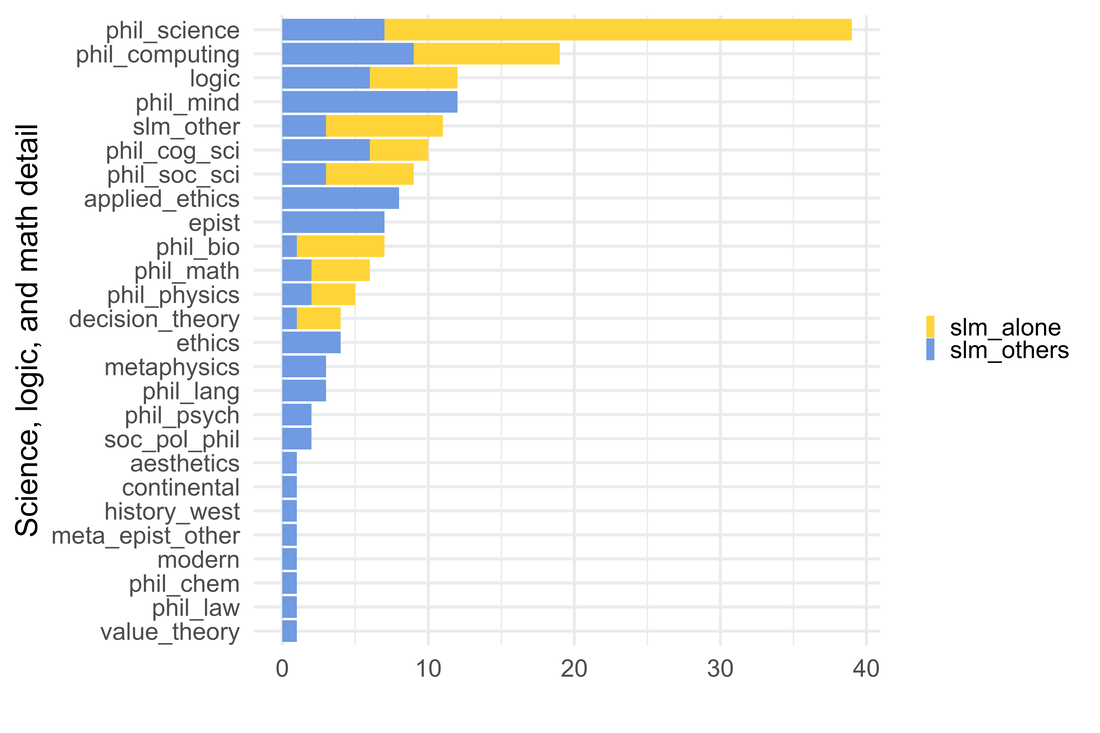
Phil science dominates. Under “slm_other” we find ads for philosophy of AI, science and technology studies, complexity/emergence, and technical methods (e.g. agent-based modeling). The least sought-after specialization in this subfield is decision theory. But it’s not as though philosophy of cognitive science or philosophy of social science are exactly dominating either.
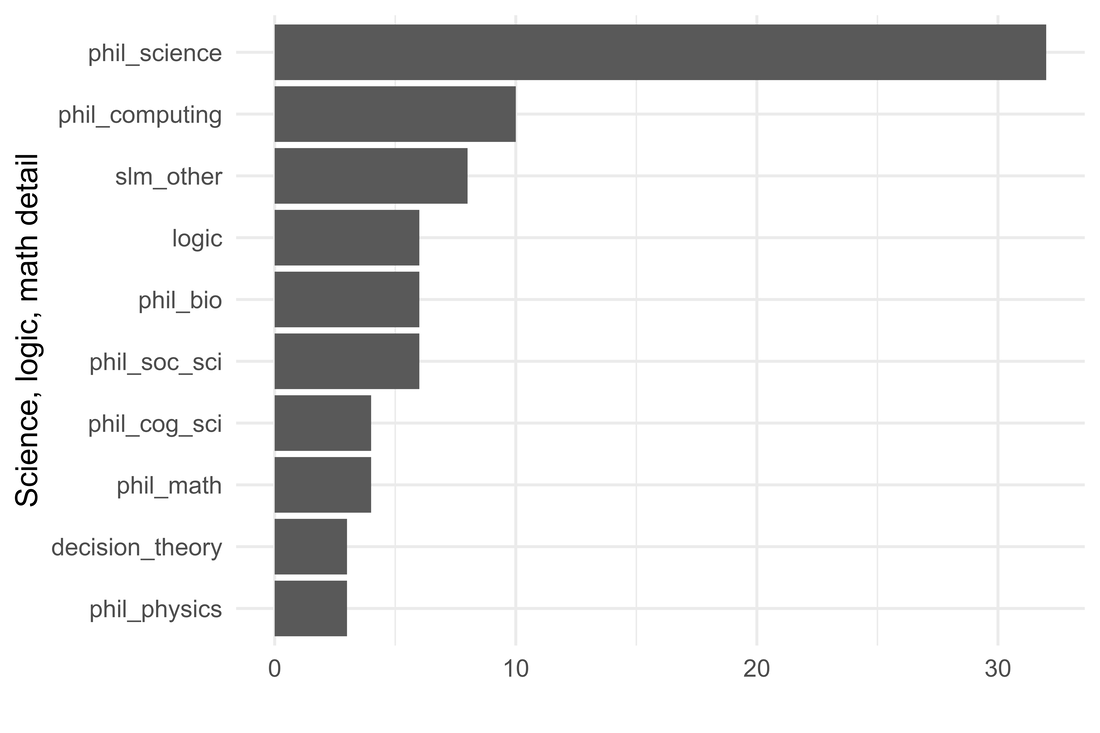
Philosophy of science dominates, but as David Wallace pointed out in a comment on Daily Nous way back when, other specializations can apply for philosophy of science jobs. But again, we’re looking at trends here and not necessarily numbers of jobs, and it’s worth noting that more departments are looking for philosophers of science rather than philosophers of some particular science.
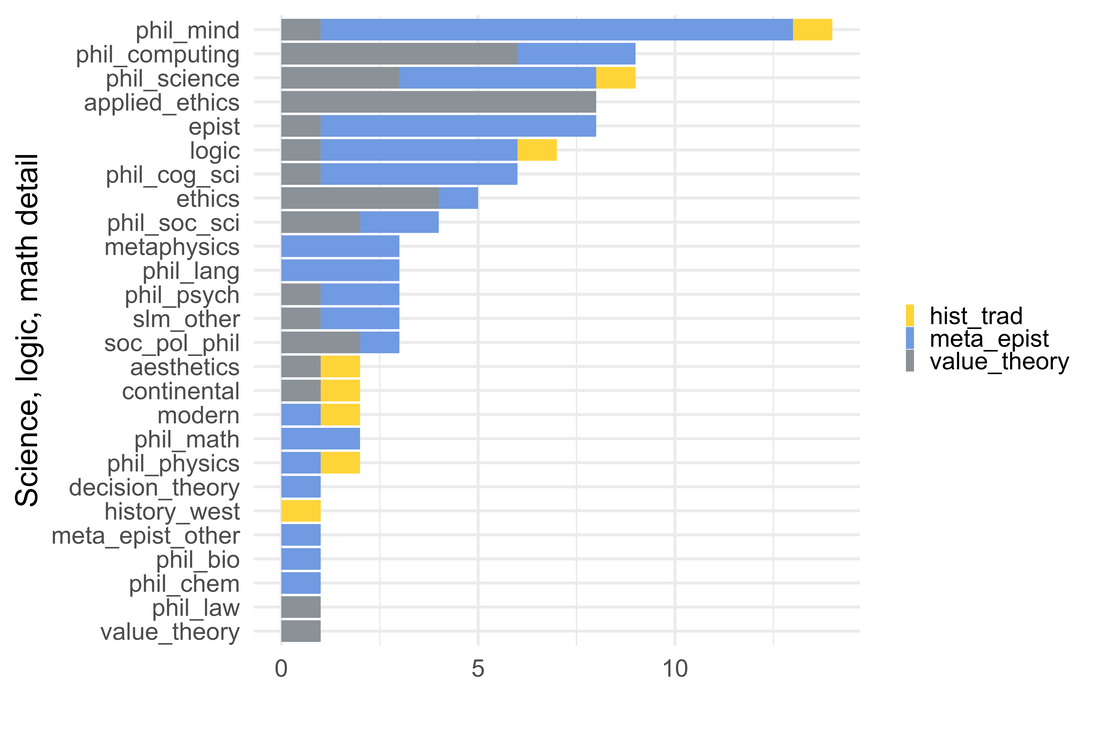
When science/logic/math ads appear with other main AOS’s, metaphysics/epistemology dominates (59), with value theory trailing (35), and history/traditions a distant third (8).
Something of note: there is a sizable number of co-occurrences of philosophy of computing with “value theory” tags and there are quite a few “applied ethics” showing up with science/logic/math ads. A lot of this can be chalked up to burgeoning interest in ethics of technology and AI. Let’s dig into that.
This table tells us how often “AI” and/or “technology” appeared with each of the main AOS’s since July 2022 (i.e. the last job cycle).
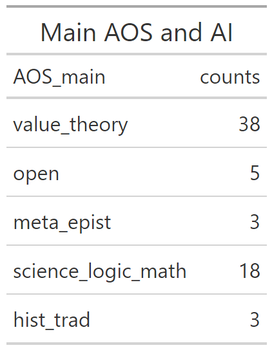
(If you’re wondering about “open”, those are ads that had an open AOS but tech/AI for AOC.) By and large, departments looking for philosophers of tech/AI are looking for ethicists rather than folks working on (say) computing theory and AI or epistemology and AI.
Now for the historical perspective. For this last job cycle, 54 ads had “AI” or “technology” appearing in either the AOS or AOC description. (AOC is included because some AOS were value theory but the AOC explicitly mentions technology or AI.) Let’s take a look at this by calendar year:
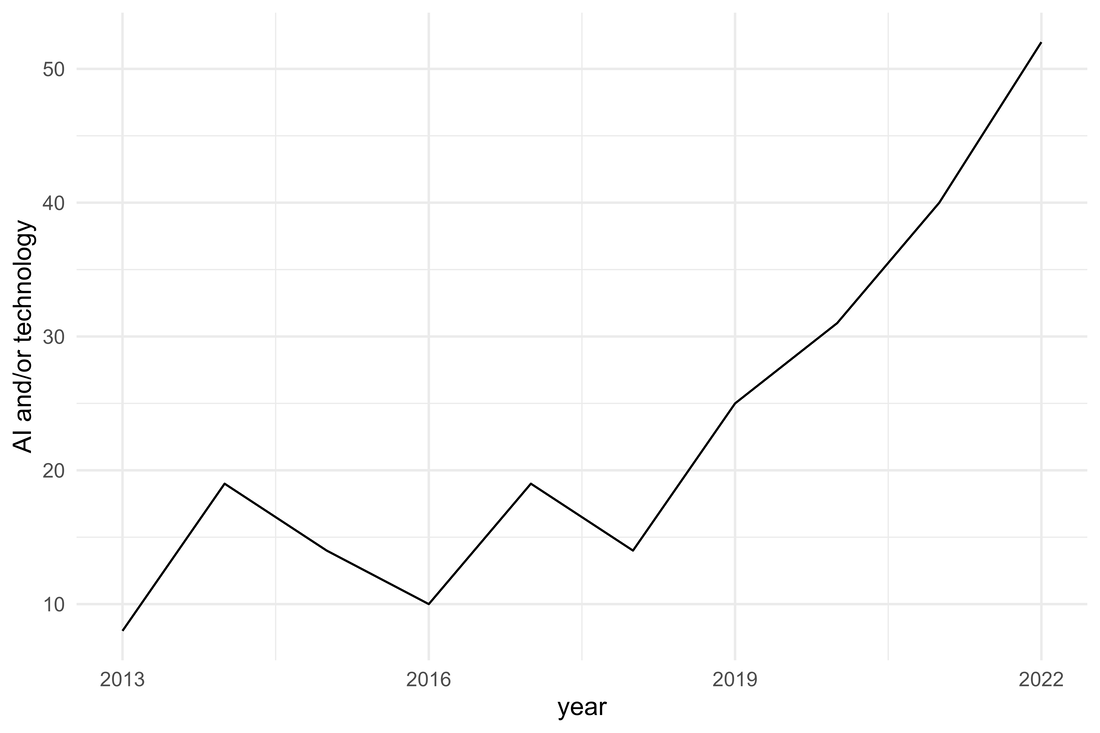
Clearly, ads for philosophy of technology and/or AI are increasing steadily. Who knows when it will plateau? Of course we don’t want Disco Stu projections…
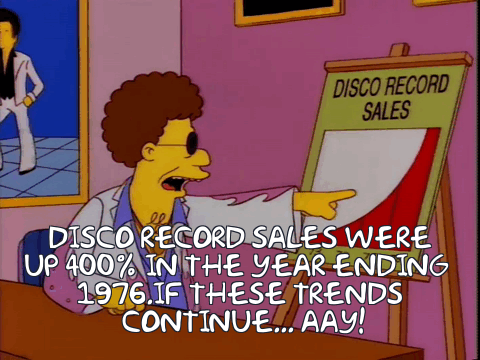
…but it seems like phil of tech/AI is here to stay.
METAPHYSICS AND EPISTEMOLOGY
Last but not least: metaphysics and epistemology. First, the big view:
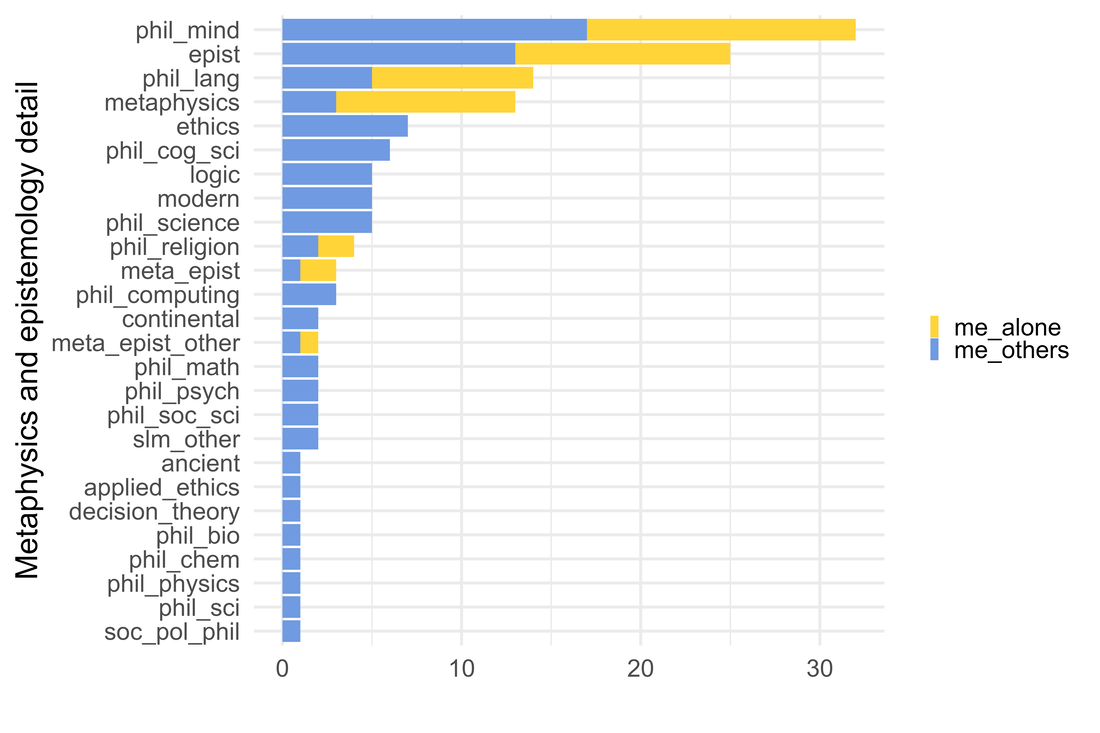
Now let’s dig into M&E ads without any other main AOS’s:
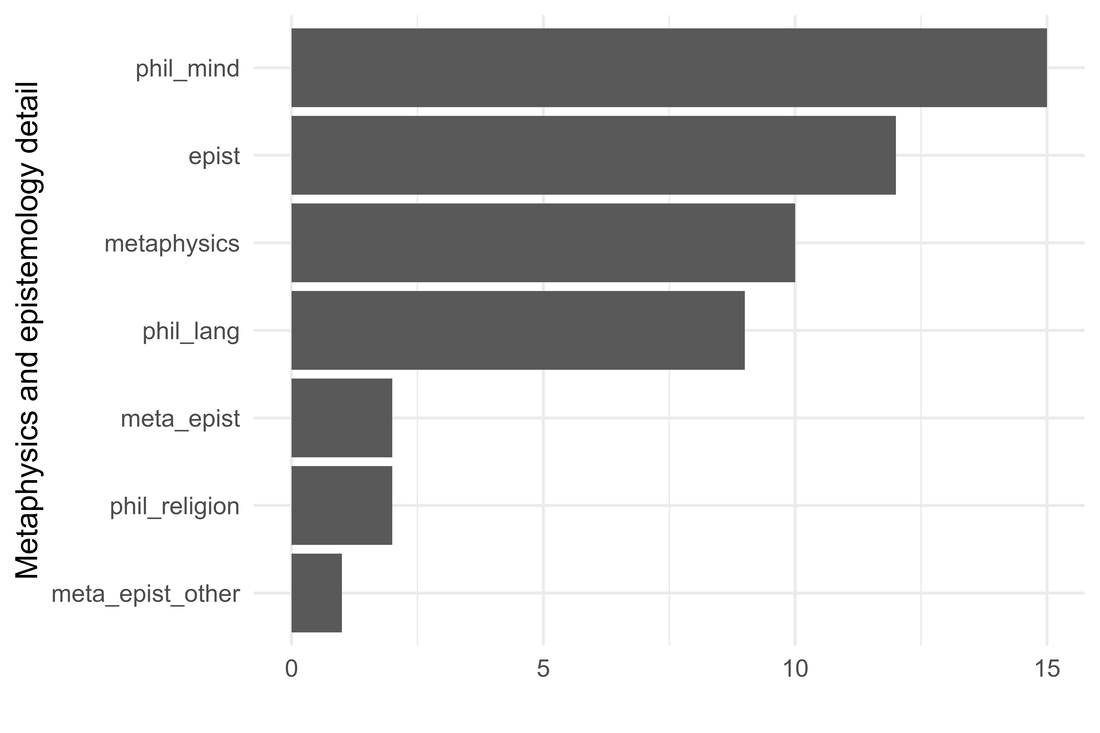
Well well well….looks like we found our LEMMings.
Under the “other” tag, we have (i) an ad looking specifically for a social epistemologist and (ii) an ad for the epistemology and/or cognitive science of religion. (And the “meta_epist” tag is where the ad’s AOS was “metaphysics or epistemology.”)
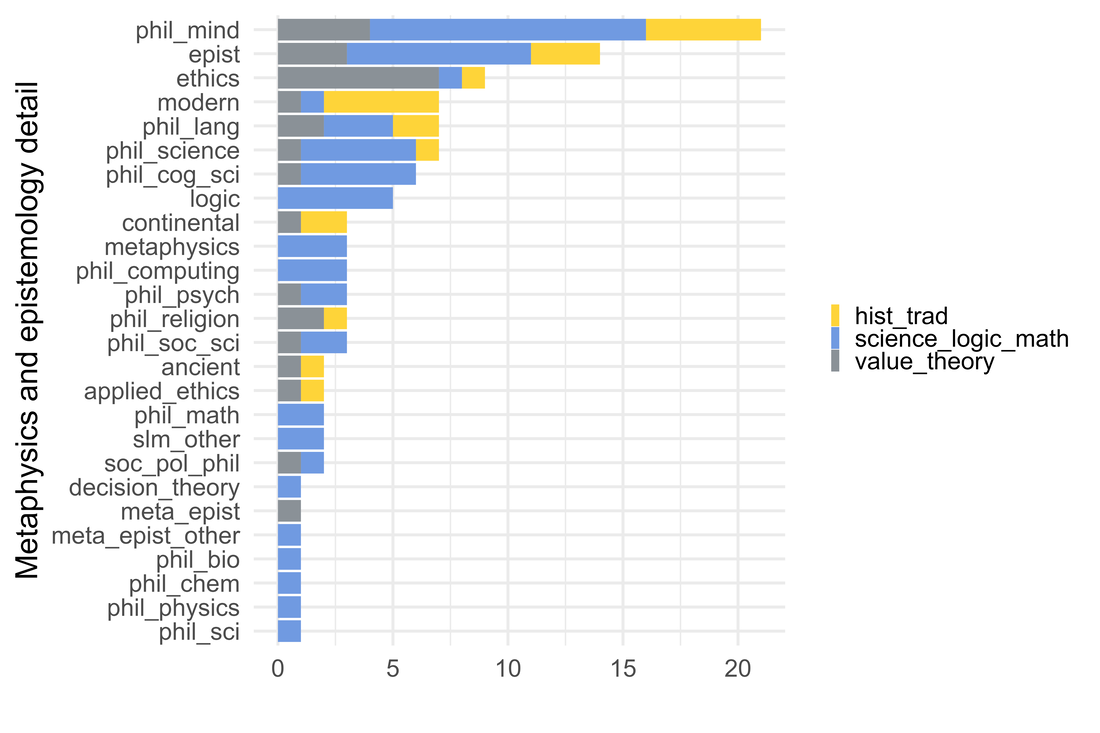
Of those ads featuring M&E, they occur more often with science/logic/math (22) and value theory (16) than history/traditions (11).
CONCLUDING THOUGHTS
So what can we conclude from all this?
First, in comparing solo main AOS with multiple main AOS in ads, only metaphysics/epistemology has fewer solo instances than joint instances. This suggests that metaphysics/epistemology is sought after but mostly in conjunction with other areas (e.g. mind and cog sci or epistemology and philosophy of science). There was less demand this year for straight-ahead metaphysics/epistemology.
Second, non-Western traditions weren’t all that sought after this last year compared to Western traditions.
Third, philosophy of technology/AI is on the rise, particularly in connection with moral questions.
That’s all for now. If you have any suggestions or analyses you’d like to see, please email me.


Nice work again, Charles, thank you!
Do you have any data speaking to listings in moral psychology, specifically?
There seems to be work for moral psychologists, presumably because they can apply for jobs in value theory broadly construed, but I wonder how often “mopsie” gets explicitly listed.
thanks! here’s a plot of ads since 2013 including “moral psychology” in the AOS
Thanks, Charles! That’s a jagged plot!
We definitely don’t want to be caught making spurious predictions about future trends. But when it comes to AI, it seems pretty clear that it will continue to be impactful for some time yet, and it stands to reason that philosophy will want to have it’s say on the subject, especially as AI increasingly moves into domains that are traditionally those of philosophy
Thanks for all the work put into this – some intriguing breakdowns.
Thanks for this Charles. One thing I’m wondering is how much (if any) of what we see here is an effect of the current distribution of AOS’s by tenured/tt people. For example, are there already more M&E people then Value people in these positions, or are there roughly the same (or already skewing towards Value)? Or, to put it another way, how much of what we’re seeing here is driven by trends in what the discipline wants to see people working on as such, rather than by contingencies in how job slots are currently filled? Clearly things like the enthusiasm for AI-related research are grounded in the former, but what about the smaller interest in, say, metaphysics versus ethics positions?
Great question. It’s hard to say. Jobs in particular AOS are a result of department needs and preferences, grant money, administrative approval/oversight, broader trends in professional philosophy, and student interest (among other things). I don’t think it’s possible to pin it down to current faculty AOS. That being said, a neat project would be looking at AOS makeup of T/TT faculty and AOS preferences in ads 🙂